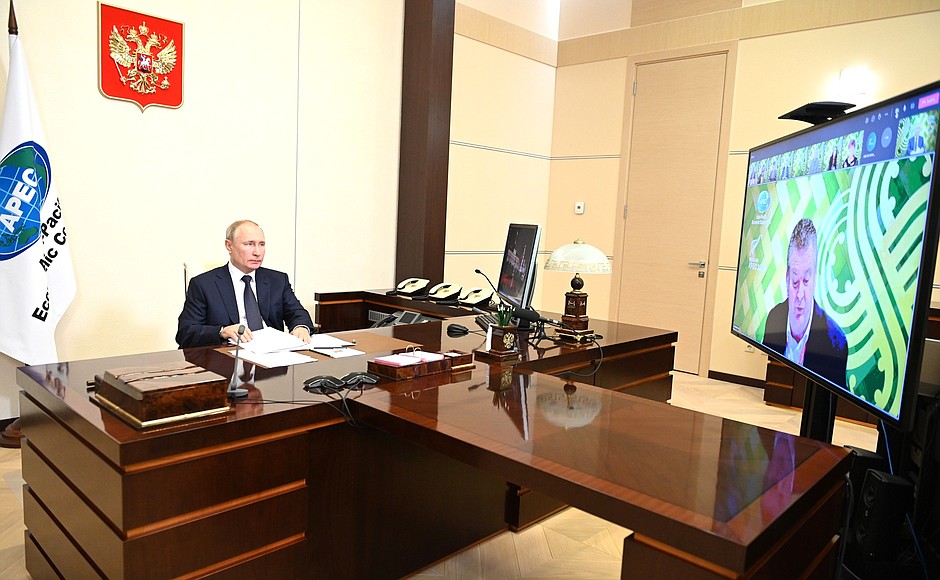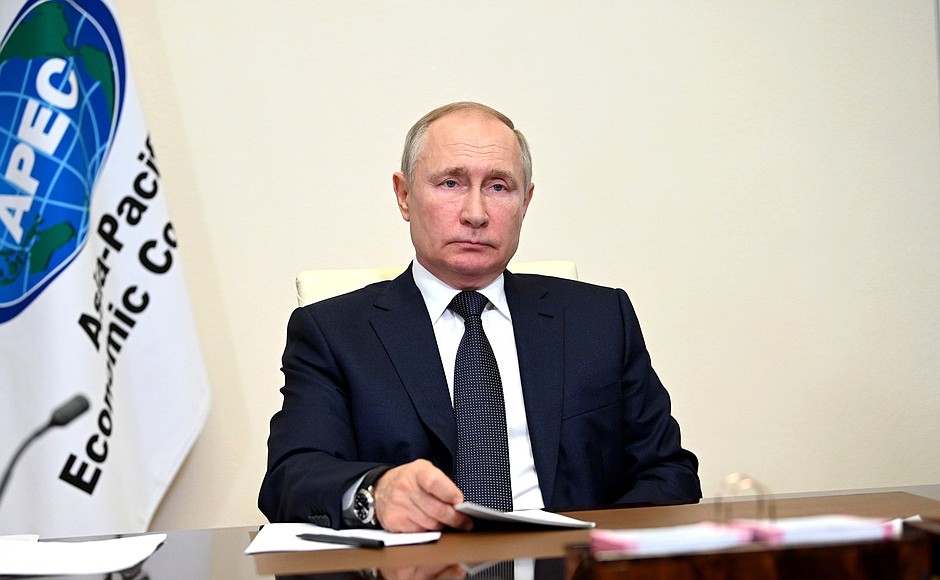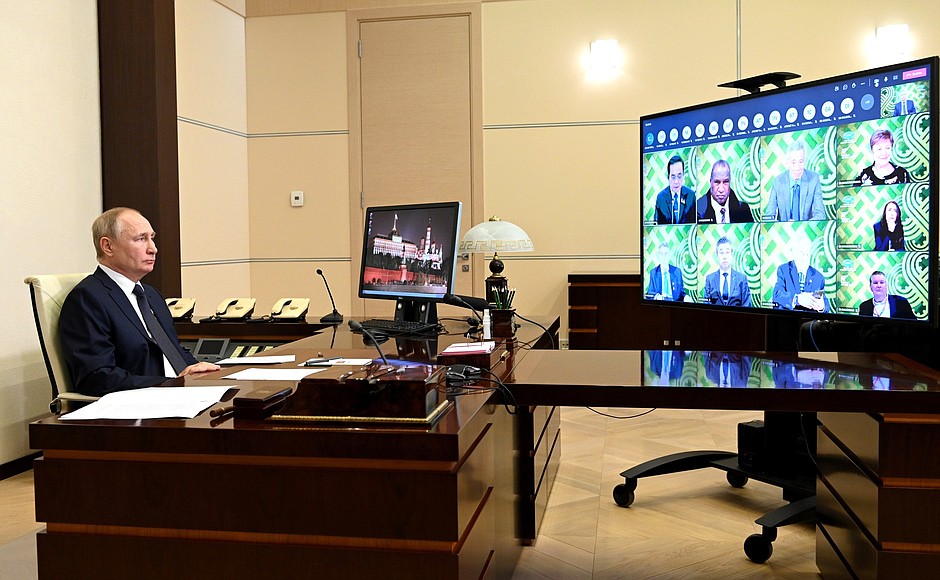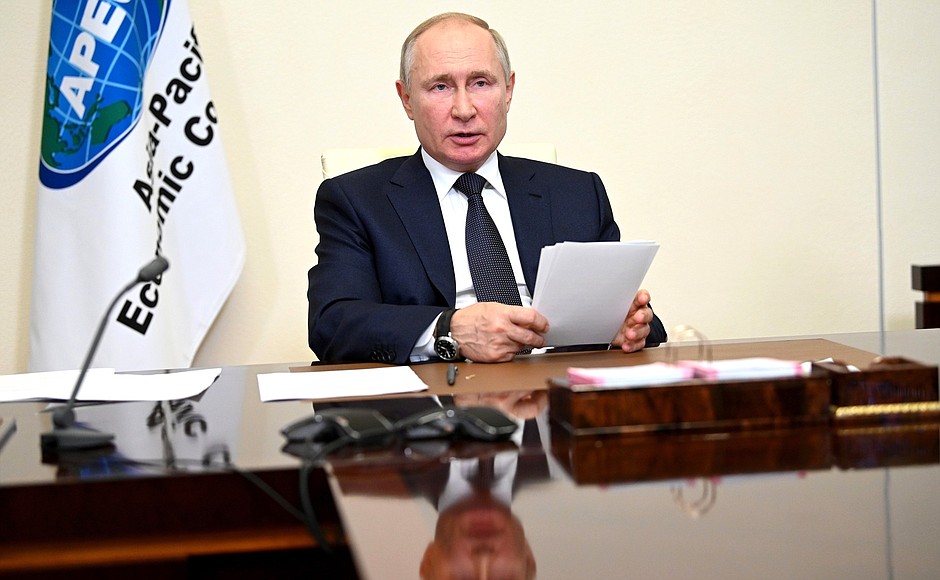Prime Minister of New Zealand Jacinda Ardern chaired the event which was held via videoconference. The meeting focused on tasks facing the Asia-Pacific countries and related to overcoming the global health and economic problems caused by the coronavirus pandemic.
The Leaders representing APEC economies adopted a joint statement following the meeting.
* * *
Vladimir Putin: Madam Chair,
Colleagues,
First of all, I would like to thank our New Zealand partners for organising this meeting, as my colleagues before me have.
All speakers mentioned the exceptional importance of the topic on our agenda today. I fully agree with my colleagues that we must act together, joining forces. Therefore, I would like to support the draft of the final document, which has clearly expressed the overall imperative for continued, concerted and coordinated interaction within the APEC framework in the fight against the pandemic and its consequences.
Regrettably, the epidemiological situation remains tense across the world. My colleagues, including a representative of the World Health Organisation, spoke in detail about this today. No country in the world is safe against the coronavirus and the spread of its new, more dangerous strains. The issues of accessibility and fair distribution of test kits, vaccines, medicines and PPE has not been dealt with either. Our colleague who spoke before me mentioned this just now.
In light of the persisting high risks, we believe that our priority is to increase the scale of vaccination. We are ready for close collaboration with our APEC partners in important areas like the organisation of large-scale vaccination of people, including migrant workers, as well as post-COVID rehabilitation and health improvement.
I would like to point out that four coronavirus vaccines have been created and are being used in Russia. All of them are safe and reliable. The high quality of the world’s first COVID-19 vaccine, Sputnik V, has been confirmed in nearly 70 countries, which have officially approved its use for vaccination.
We are actively promoting the local manufacturing of our vaccines abroad based on technology transfer. Contracts have been signed with several foreign companies, including from the APEC economies, for manufacturing the Sputnik V vaccine in a total amount of over 800 million doses a year. We believe that it is vital to continue working together to create new facilities for the production of vaccines in the Asia Pacific Region, and also to remove administrative and other obstacles that might hinder their production and deliveries.
Of course, the speed of the global vaccination effort will largely determine how soon we revive our economies, minimise the risk of new coronavirus waves, and overcome the negative trends in the social sphere.
See also
As has already been said today, the pandemic seriously affected all APEC economies without exception. The total number of cases in our countries is now more than 53 million, with over 1.4 million deaths. Our aggregate GDP went down 1.9 percent as of 2020.
Russia has implemented a package of measures to maintain levels of personal income and employment, to support businesses, mitigate losses and help the worst-hit industries. These measures have allowed us to confidently reach a positive dynamic this year. It would be fair to say that generally, we have overcome the consequences of the pandemic and our economy has recovered. We are ready to share our anti-crisis practices, including as part of a ministerial dialogue on macroeconomic and structural policies.
In the face of the pandemic, it is becoming increasingly relevant to expand cooperation between the Asia-Pacific countries in digitalisation, which is an extremely important area. Our colleagues spoke about this today at the very beginning of this meeting. We propose taking a broader look at our cooperation on the digital agenda, including such areas as implementing modern information technology in healthcare, education, social welfare, information security and personal data protection.
It is also important to continue the comprehensive implementation of APEC Internet and Digital Economy Roadmap. This work requires more involvement from the business community, especially in view of the interest repeatedly expressed by the APEC Business Advisory Council.
Of course, in order to achieve the goal, set by APEC, of creating a truly open, dynamic and sustainable society across the Asia-Pacific Region by 2040, we need a transparent, predictable and non-discriminatory environment for trade and investment.
The world’s leading business forums can also contribute to the search for ways to reinvigorate the global economy. Naturally, they must resume their activities only in strict compliance with all sanitary requirements. One example is the St Petersburg International Economic Forum held last June in Russia. Around 800 agreements worth over 50 billion dollars in total, which is a record, were signed on the sidelines of this forum.
We hope that representatives of the region’s economies will actively participate in another forum hosted by Russia, the Eastern Economic Forum on September 2–4 in Vladivostok.
Finally, I would like to wish New Zealand success in hosting APEC this year.
Thank you.




